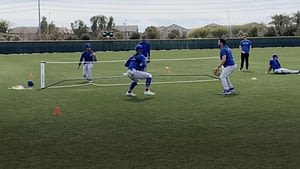First Impressions from the Athletics’ New Home Opener in Sacramento
Picture this: a local television news crew eagerly stationed outside the Sawyer Hotel in downtown Sacramento on a Sunday night, cameras poised to capture every moment as the Chicago Cubs, bleary-eyed from their journey, stepped off their bus. This wasn’t just any arrival; it marked the first time a major league baseball team had come to Sacramento to play a legally sanctioned regular-season game. For those curious about what Ian Happ looks like when surprised by a camera and a reporter, CBS-13 was the channel to watch.
As Cubs pitcher Matthew Boyd put it, “That was different. But it’s the first time a big league team has come to Sacramento, and they’re excited. Baseball’s that cool thing that brings everyone together.”
Indeed, it was a significant week for Sacramento, particularly West Sacramento, which proudly boasts street signs declaring it “The Baseball Side of the River.” The city had the honor of hosting the first three games of the Athletics’ anticipated three-season interregnum between Oakland and Las Vegas. For a brief moment, Sacramento could call a big league team its own, even if the team chose to identify simply as the Athletics, a geographically nonspecific version of a Major League Baseball team.
The atmosphere at Sutter Health Park for the inaugural series was unique. It looked and sounded like big league baseball, but something felt different. The crowds, limited to about 14,000 fans, were mostly subdued. Perhaps it was the limited seating, or maybe it was the Athletics being outscored 35-9 over the three games, with the first and third games being particularly lopsided.
Despite the rough start, expectations for the Athletics remain high. The team made some surprising financial moves, signing free agent Luis Severino and extending contracts for Brent Rooker and Lawrence Butler. These moves ensured a payroll that complied with revenue-sharing rules and improved the team. With a respected manager in Mark Kotsay and promising young players, there’s a sense that the Athletics could be building something special in West Sacramento.
It’s a long season, and three games are just a small part of the journey. However, the Athletics’ debut in Sacramento brought back some familiar challenges. They walked 10 batters in the home opener, committed errors leading to four unearned runs, and walked seven more in the final game. The crowds were mostly quiet, with Cubs fans making more noise until it felt mean. A’s fans, when they found something to cheer for, reacted as if they were at a piano recital.
The Athletics’ players are adjusting to their new surroundings. Closer Mason Miller, who has spent only five nights in Sacramento, is trying to see the move as an opportunity to bond with teammates. Rookie second baseman Max Muncy is on a quest to find the best local restaurants, hoping to earn some credibility with his teammates.
The Athletics face the challenge of playing in a minor league ballpark and sharing it with the Triple-A Sacramento River Cats. It’s like a senior rooming with a freshman; the senior has priority, but must still share the space. The field will endure 155 games this season, and the clubhouse is located beyond the outfield wall, disconnected from the dugout.
Severino, making his first home start for the A’s, had to adjust his routine. Once he left the clubhouse, there was no going back. He had to ensure his jacket and notes were with him in the dugout. His usual practice of watching the game on TV from the clubhouse was on hold, and he had to sit with his teammates, knowing every emotion would be captured by cameras.
Players coming off the bench have limited options for warming up. In other parks, they could use a cage behind the dugout, but here, they must improvise. Cubs infielder Jon Berti suggests, “Just do some arm circles and maybe run in place. Make it old-school.”
Only one of the three games sold out, a surprising outcome given the excitement surrounding Sacramento’s status as a major league city. Tickets for the final game were available for $20 on the secondary market shortly before the first pitch. The A’s have the highest median ticket prices in baseball at $181, but the scarcity-demand strategy hasn’t quite paid off yet.
It’s not entirely fair to judge Sacramento’s potential as a baseball town based on its support for a team that won’t bear the city’s name. And it’s certainly not fair to judge the region based on fans’ willingness to support an owner who moved the team from Oakland after 57 years.
In the days following the announcement of the A’s move to Sacramento, a local sports fan expressed mixed feelings:
- I hate it in that we are just bailing out Fisher
- I hate that we are basically acting as Seattle a decade ago with regards to the Kings and poached the A’s away from Oakland. That’s an awful feeling I wish on no one
- I am interested to see if this actually goes anywhere other than just bailing out Fisher for 3 years while he waits out whatever magic is gonna happen in LV
- Reeeeeally wish Vivek read the room on this one
- We could buy $30 lawn seats and catch a ball from Mike Trout or even better, Austin Slater, on a Wednesday night in Sac. That would be wild
The A’s point out that there weren’t many crowds of 10,000 on Tuesday nights in Oakland. Sacramento is using this opportunity to audition for its own big league team. If the A’s can’t sell out a minor league stadium in an area with established fans, what does that mean for their move to Las Vegas, where they anticipate sellout crowds in a 33,000-seat stadium?
For now, the focus is on enjoying big league baseball in a quaint, intimate ballpark. It’s a chance to experience the game in a setting reminiscent of the past, with a state-of-the-art video screen and simple concessions. The workers at the ballpark are enthusiastic, but the long-term sustainability of this arrangement remains to be seen.
Transforming the team store from River Cats to Athletics gear is a daunting task, requiring overnight shifts to switch out merchandise. The process will repeat every 10 days to two weeks, adding to the challenges of hosting a major league team in a minor league setting.
As the Athletics settle into their temporary home, the question remains: can they build something lasting in Sacramento, or is this just a stop on their journey to Las Vegas? Only time will tell.
Originally Written by: Tim Keown





















